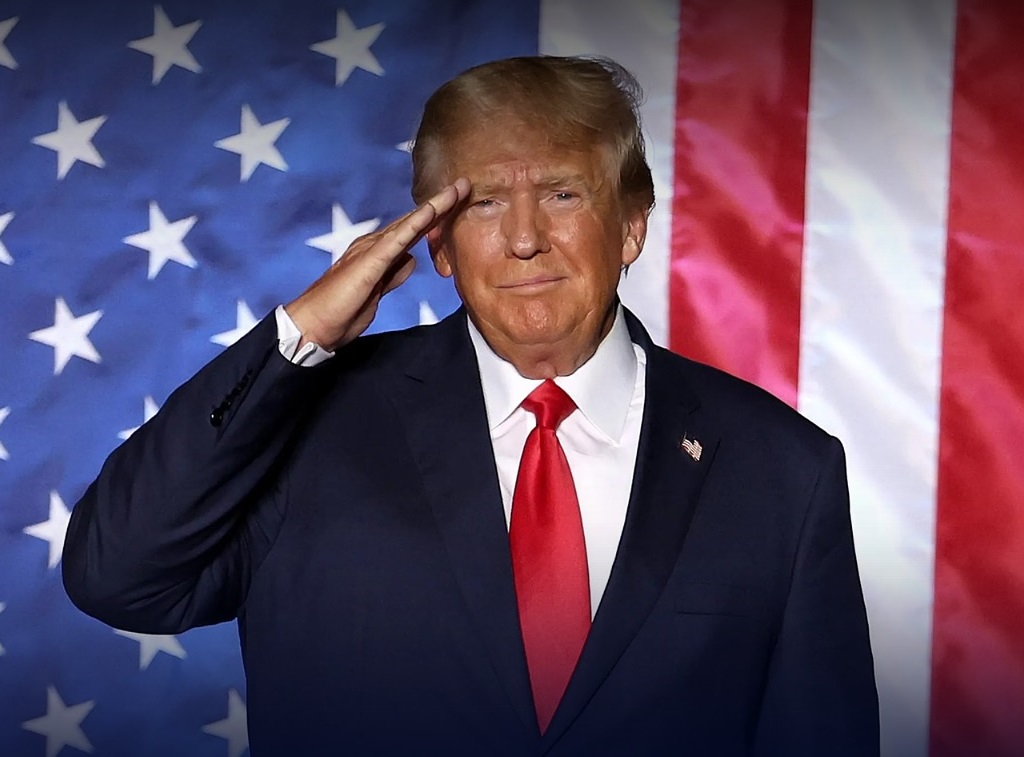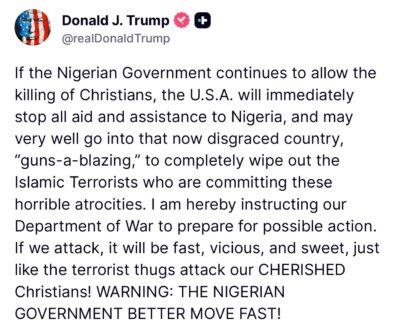
Trump Issues Stark Warning to Nigeria, Threatens “Guns-A-Blazing” Intervention
Trump’s explosive warning signals a potential rupture in U.S.–Nigeria relations as he threatens to halt aid and prepare military action to stop what he calls the “mass slaughter” of Christians.
Washington D.C. — November 2, 2025
U.S. President Donald Trump on Saturday issued a stern and uncompromising warning to the Nigerian government over the continued killing of Christians in the country, declaring that the United States could withdraw aid and even deploy military force if the violence persists.
In a fiery post on social media, Trump said his administration was ready to take drastic action “to save Nigerian Christians,” stating that the U.S. would halt all aid and “may very well go into that now disgraced country, guns-a-blazing, to completely wipe out the Islamic Terrorists” if attacks on Christians are not stopped.
The president added that he had instructed the U.S. “Department of War to prepare for possible action,” promising that any strike would be “fast, vicious, and sweet,” and warning Nigerian authorities in capital letters: “THE NIGERIAN GOVERNMENT BETTER MOVE FAST!”
“If the Nigerian government continues to allow the killing of Christians, the U.S.A. will stop all aid and assistance to Nigeria, and may very well go into that now disgraced country, guns-a-blazing,” Trump wrote. “I am therefore instructing our Department of War to prepare for possible action. If we attack, it will be fast, vicious, and sweet, just like the terrorist thugs attack our CHERISHED Christians! WARNING: THE NIGERIAN GOVERNMENT BETTER MOVE FAST!”
Trump’s reference to Nigeria as a “disgraced country” has stirred debate. Critics say the description, while blunt, highlights the reality of what many see as a “dehumanizing situation” in Nigeria, one that global media outlets have largely ignored. Among these are the persistent killings of people in the country’s Eastern region for demanding democratic reforms and self-determination.
The president’s statement characterized the crisis as an “existential threat” to Christians, blaming “Radical Islamists” for the ongoing mass slaughter. The accusation mirrors previous reports by human rights organizations and faith-based advocacy groups that have consistently condemned the violence, describing it as Christian genocide.

Ironically, before becoming president, Bola Ahmed Tinubu himself more than once acknowledged that Christians in Nigeria were being targeted. Since assuming office, however, he has rejected this characterization, insisting that his administration remains committed to protecting the rights of citizens of all faiths.
Nigerian authorities and government-aligned analysts argue that the country’s security challenges stem from multiple overlapping conflicts rooted in ethnic, regional, and local tensions. This framing, many critics note, has been used to deflect discussions about religious persecution and to “drown solutions in the ambiguity of complexities.”
Peoples Chronicles had earlier reported that the U.S. State Department had re-designated Nigeria as a “Country of Particular Concern” for severe violations of religious freedom, a move that sparked heated debate both within Nigeria and across Africa. (Read Article Here)
One thing is undeniable: Trump’s new threat, halting aid and ordering the Pentagon to prepare contingency plans, could further strain diplomatic relations between Washington, which appears determined to stop the killings, and Abuja, which has been accused of wanting the killing to continue.
Analysts warn that any unilateral U.S. military action on Nigerian soil could trigger significant legal and political challenges. Still, many Nigerians facing what they describe as “Islamization attempts” have expressed support for Trump’s warning, viewing it as long overdue international attention.
Critics of Western media coverage argue that global outlets have long downplayed the persecution of Christians in Nigeria by framing the attacks as “farmer-herder clashes.” They contend that such terminology obscures the religious nature of the violence, insisting that it is, in reality, “religious cleansing” carried out by armed Fulani Terrorists sometimes disguised as herders.
As tensions rise, Trump’s statement has reignited international debate over how the world should respond to what has been described as one of the deadliest and most underreported crises facing Christians in the 21st century.